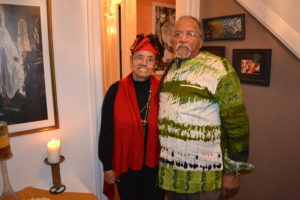As family and friends approach the steps leading to the three-story Oak Lane Tudor home, they see the clamor of the little ones placing tea candles along the path leading to the door. The weather is cold and crisp in Philadelphia, as always in winter, making the warmth inside appreciated, every year anticipated. It is the Sunday before Christmas and in the Jackson household it is time for the Elder’s dinner. Hank and Bobbie Jackson continue a tradition that dates to 1983, inviting the extended community to their home to celebrate the ancestors, the elders, and the total idea of community. The concept of extended family is profound. It is a value one cannot help but take away from the gathering.

Imagine 80 people representing 20 families that are committed to each other’s development and mutual support. Inspiration and accountability drive the young people to achieve success and encourage the elders to strive for longevity and health. Everyone in the room enjoys the blessings of their own family and that of their collective community. This collective was a decision in the 70’s to share both financial and spiritual union across blood and socioeconomic bounds. This is revolutionary in a country based on rugged individualism and pursuit of money as identity. The ideals are grounded though and have given life to success and prosperity for the people the families encompass and the those the families touch. The legacy of Umoja, unity, and Ujamaa, cooperative economics are universal laws and will always persevere. Gratitude for this legacy resides in all that gather this night.
Like Kwanzaa, the elder’s dinner is a non-religious inclusive celebration that takes advantage of the free time and festive nature of the holiday season. This year marks the 34th anniversary of the event. Hank and Bobbie, natives of South Philadelphia, brought the tradition to Oak Lane when they moved to the area. This night is a special opportunity to honor the elders of the village and celebrate the accomplishments and milestones of the year. Before eating, a candle is lit and the floor is opened for individuals to share accomplishments special to their lives (promotions, births graduations, etc.). The night represents a reverence for the life cycle, peacefully challenging those gathered to embrace their divine connection to mortality. Those that started out as the elders like Hank’s mother, Russie Jackson, have since transitioned to become honored ancestors. The founders of the event, Hank and Bobbie, and those in their age range, are the elders. The children now have children of their own and the circle continues unbroken.
In a time when television feeds a diet of contention, violence, promiscuity and anxiety, events like the Elder’s Dinner counteract this vibration by promoting ritual, family, and community in a wholesome environment. How many children growing up in Philadelphia today know the experience of genuine community, know the trails and the joys of having many eyes in the neighborhood that will make sure they walk in integrity? There was a time, not too long ago, when this was a norm. Everyone needs people who love them as family but perhaps stand just far enough away to witness their growth with less sensitivity and judgement. Everyone needs community to whom they can be accountable, that allow them to serve their gifts. The Elder’s Dinner is a culmination of these sentiments once a year, less those gathered forget they belong, they are loved and they matter. Many thanks to the Jackson family for their vision and for keeping the flame burning for 34 years. May the tradition of the Elder’s Dinner thrive forever more, for our children’s children’s sake. May it serve as an example of genuine prosperity to the world.
Related posts
Subscribe

Subscribe To Our Newsletter
Join our mailing list to receive the latest news and updates.




Social Media